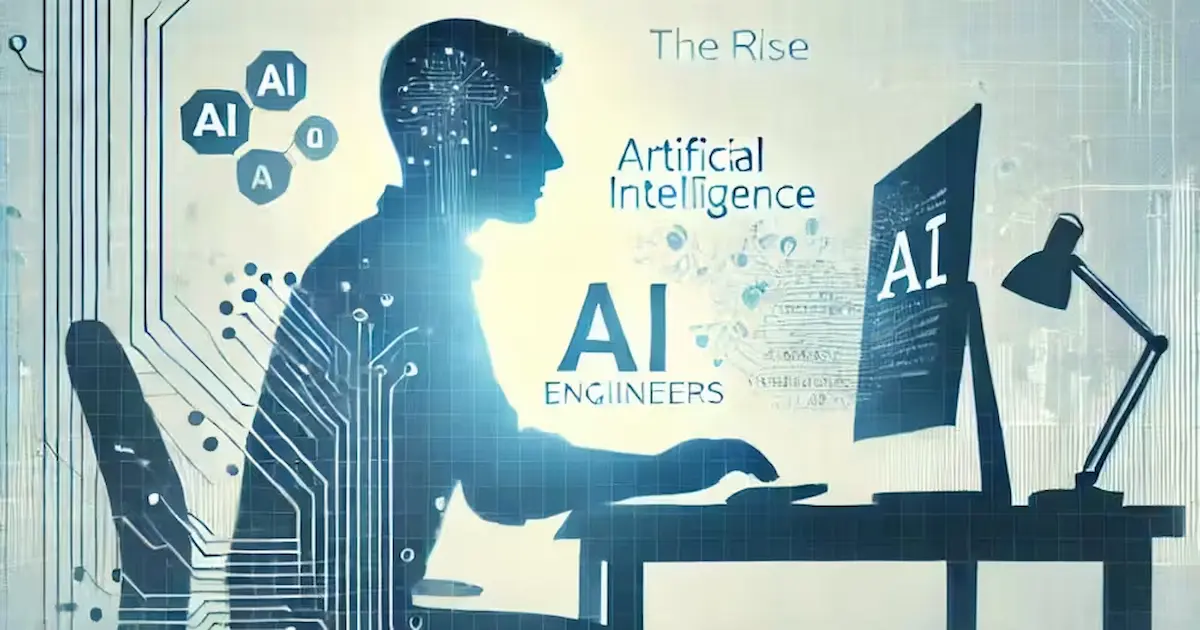
The Rise of AI Engineers in Software Development
- Harsh Bopaliya
- AI , Software Development , Engineering
- 30 Oct, 2024
This blog post explores the emergence and role of AI engineers in modern software development. It discusses the importance of AI engineers, their key skills, applications across various industries, and future trends in AI engineering.
The Evolution of AI Engineering
The landscape of software development is undergoing a profound transformation. As AI reshapes industries, a new role has emerged: the AI Engineer. Unlike traditional software developers or data scientists, AI Engineers bridge the gap between data science, machine learning, and software engineering, focusing on creating intelligent, scalable applications through the integration of foundational models.
Traditional AI Product Development: The Challenges
The conventional approach to AI product development involved multiple specialized roles:
- Data Scientists: Building machine learning models
- ML Engineers: Optimizing and deploying models
- Software Engineers: Integrating models into applications
However, this approach faced significant challenges:
- Integration difficulties
- Performance issues due to communication gaps
- Inefficient algorithms
- Hardware limitations
- Data constraints
- Skill shortages
The Game-Changing Impact of Foundational Models
The introduction of foundational models, particularly Large Language Models (LLMs), has revolutionized AI development:
Key Advantages:
- Pre-trained with vast capabilities
- Fine-tunable for specific tasks
- Reduced development time
- Lower resource requirements
Companies like Google are leveraging these models to create new business opportunities through Model-as-a-Service (MaaS), offering cutting-edge AI capabilities without the need for extensive in-house expertise.
The Modern AI Engineer: A New Breed of Professional
Core Responsibilities:
- Model Fine-tuning: Adapting foundational models for specific use cases
- LLM Expertise: Maximizing the potential of language models
- Prompt Engineering: Optimizing model outputs
- LLMOps Management: Ensuring smooth deployment and operation
- Technology Evolution: Staying current with AI advancements
Key Distinctions:
AI Engineers differ from data scientists by:
- Focusing on application and integration
- Working at the inference level
- Optimizing system performance
- Ensuring seamless software integration
The Industry Shift: Implications and Opportunities
The rise of foundational models is driving significant changes:
Current Trends:
- Growing demand for AI Engineers
- Evolution of traditional software roles
- Streamlined AI application development
- Reduced emphasis on deep ML expertise
Career Opportunities:
- Software developers transitioning to AI Engineering
- New roles in AI application development
- Specialized positions in model integration
- Opportunities in LLMOps
Real-World Applications and Case Studies
Example: Swiggy’s AI Implementation
-
Specific Challenges:
- Custom recommendation system (FoodNet)
- Delivery time optimization
-
General Applications:
- Customer service chatbots
- Demand forecasting
- Real-time analytics
Business Opportunities with Foundational Models
Available Platforms:
- OpenAI API: Powerful but with cost considerations
- Hugging Face: Open-source alternatives
- Amazon Bedrock: Enterprise-scale solutions
Development Tools:
- LangChain for API integration
- Comprehensive AI application frameworks
- Performance optimization tools
The Future of AI Engineering
As we look ahead, several key trends emerge:
- Growing Demand: Increased need for AI Engineering expertise
- Skill Evolution: Blending of software, data science, and ML skills
- Application Focus: Shift toward integrated, practical solutions
- Career Opportunities: Expanding roles and responsibilities
Conclusion
The emergence of AI Engineers marks a significant shift in software development. As foundational models become more powerful and accessible, these professionals will play an increasingly crucial role in shaping the future of technology. Whether you’re a seasoned developer or considering a career change, AI Engineering offers exciting opportunities to stay at the forefront of innovation.
For those looking to enter this field, the time is now. The future of software development is increasingly AI-driven, and AI Engineers will be at the helm of this transformation.
HashNode Reference
For reference — Blog Post
Contact
For any inquiries or feedback, please reach out at:
- Email: bopaliyaharsh7@gmail.com



